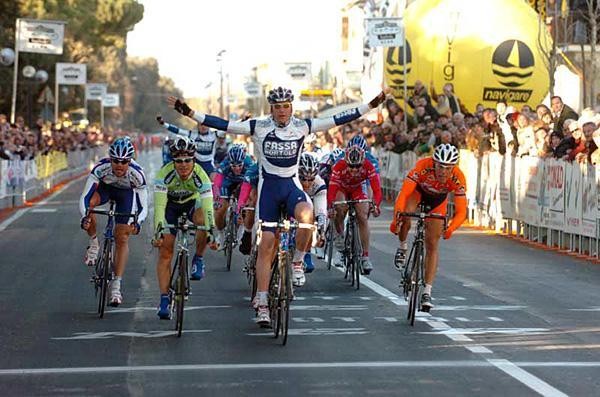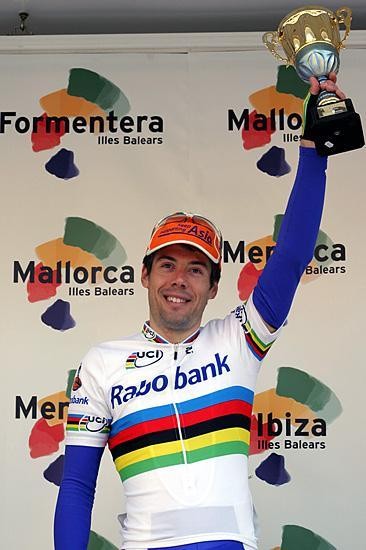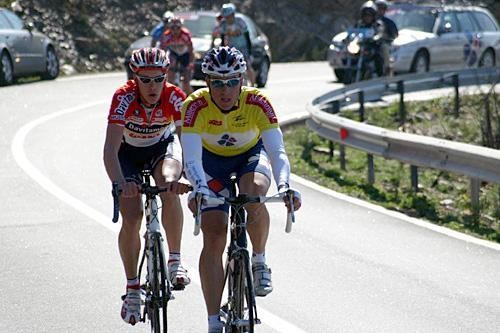Getting things rolling in February
After a winter break and some racing for those in the southern hemisphere, the European and US...



Tales from the peloton, January 31, 2006
After a winter break and some racing for those in the southern hemisphere, the European and US racing circuits get back into the swing of things during February. By the end of the month it's time for the classics [and the pain] to begin in Belgium as the season begins to take shape. Les Clarke takes a look at the racing highlights of February.
In France the season opens with GP d'Ouverture La Marseillaise on January 31, followed the next day by Etoile de Bessèges, held from February 1-5. This normally attracts the cream of French cycling - riders such as Christophe Moreau, Patrice Halgand, Jean-Patrick Nazon and Sylvain Chavanel make the trip to open proceedings for the year, with last year's race won by La Française des Jeux's Freddy Bichot. Against the likes of Tom Steels, Jens Voigt and veteran Jaan Kirsipuu, a win is very sought after. Look for young pros out to make a name for themselves early in the season to remind the old hands they'll have to be on top of their game during the year.
After some issues with rider payments and with a later starting date for 2006, organisers of Malaysia's Tour de Langkawi (February 3-12) have got their show on the road. They're promising some strong racing from teams such as Colombia Selle-Italia, Ceramica Panaria - Navigare and Navigators Insurance, all of whom have performed well in the past and cite this race as one of their goals for the season. Defending champion Ryan Cox will return with a South African national team, as his Barloworld pro team have decided to skip this year's edition. In Italy, the season kicks off with the GP Costa degli Etruschi on February 4, with previous winners including Alessandro Petacchi [2005] and Mario Cipollini [1998 & 2000]. It starts a long season which runs all the way to mid-October, when a host of smaller one-day races that attract the likes of Paolo Bettini draw the the road calendar to a close.
The Spanish season gets underway on February 5 with the Challenge Illes Balears. After winning here last year, Spain's Oscar Freire took most of 2005 out with an injury that affected the three-time world champion severely. With several major Spanish races cancelled in 2006, the Challenge Illes Balears may increase its profile in the absence of races such as Setmana Catalana and Vuelta Ciclista a Aragon. Next in the 'late winter festival of early cycle races' is the French Tour Méditerranéen, held during February 8-12. It's a five-stage tour, with riders such as La Française des Jeux's Australian leader Brad McGee looking to establish themselves as a shorter stage race specialist - he'll try and capitalise on his all-round ability. In 2005 it was Jens Voigt, another rider with characteristics similar to McGee's, who began his great early-season run with an overall win in the event. Look out for the German and his CSC crew again in 2006 as they aim to dominate these shorter stage races.
In an attempt to follow what little sunshine there is during February, it's onto the appropriately-named "Ruta Ciclista Del Sol", the Vuelta a Andalucia from February 12-16; the riders do actually get to race in the sunshine! Although only run over five stages, this race has something for everyone, with some tough climbing and a couple of stages for the sprinters. Last year's race was won by Comunidad Valenciana rider Francisco Cabello Luque, with Alessandro Petacchi showing good form ahead of Milan-San Remo [which he won] by taking the last two stages, tailor-made for sprinters. The sun shines regularly over this race, and riders appreciate the break from the cold they've endured throughout the training period. Look out for another Comunidad Valenciana onslaught in 2006 as the Spanish team, who've been rocked by scandal and financial problems the last two seasons, show everyone they still know how to race.
Heading over to Portugal and it's time for the Volta ao Algarve to begin the season on the edge of the Iberian peninsula from February 15-19. This is a race used by Lance Armstrong in the past as an early-season indicator of where he was at physically and whether he made any improvements in the off-season. Several Pro Tour teams will send a crew to this race, and with plenty of sprinting involved it offers a good chance for the fast men to have a go while there's enough climbing to provide a test for most riders. Teams such as Discovery Channel will want to blood some of their younger riders, so it becomes a clash of the locals versus the young pros. Should be fun!
Get The Leadout Newsletter
The latest race content, interviews, features, reviews and expert buying guides, direct to your inbox!
From Portugal we cruise across the pond to the US, where the inaugural Tour of California (February 19-26) awaits European-based American pros such as Levi Leipheimer, who's said on numerous occasions he's very excited about riding a big tour close to his home. There's been plenty of publicity and hype for the race, with no shortage of money to ensure the eight stages run smoothly. Local team Health Net will be motivated to perform well on home turf, and with a squad including Greg Henderson, Hayden Roulston and Tim Johnson, it'll surely be among the action up the hills and in the sprints.
Coming back to the warmer surrounds of south-eastern Australia, it's time for the ladies to kick off their world cup campaigns with the Geelong Tour (February 21-23) and Geelong world cup round (February 26). With a number of high-profile team changes, the racing should be intense and the conditions tougher than expected. Last year's winner of the Geelong world cup, Rochelle Gilmore, will be back in 2006 and up against Oenone Wood (Equipe Nurnberger), Liv Gollan (Nobili) and Judith Arndt, who'll be riding alongside super sprinter Ina Teutenberg in T-Mobile's new-look squad, which is sure to shake things up in 2006.
It's then time for the big fellas to come out and play as the Belgian classics get underway with Omloop Het Volk on February 25 followed by Kuurne-Bruxelles-Kuurne the next day. Het Volk, one of the most important Belgian races on the calendar, was won by Nick Nuyens in 2005, with teammate Tom Boonen taking second. Local riders will be going all out to take a win on home turf, but after Quick Step's domination of the classics last year, and with Boonen in fantastic form already in 2006, that win will be hard to wrest from the grips of the young Belgian superstar.
Discovery Channel's man for the classics, George Hincapie, managed a win in last year's K-B-K with a strong showing over the final kilometres of what is a typically cold, tough Belgian race. Look out for a donkey, the semi-affectionate term for Kuurne locals, which is also used as the race mascot - there's an argument that you'd have to be a donkey to race in the cold of Belgium in late February. But having said that, this race has most of the hype of the better-known classics and fans are ecstatic that it's that time of year again - watch for Stijn Devolder and the veteran Peter Van Petegem to have a shot at the win on home turf early on in 2006.